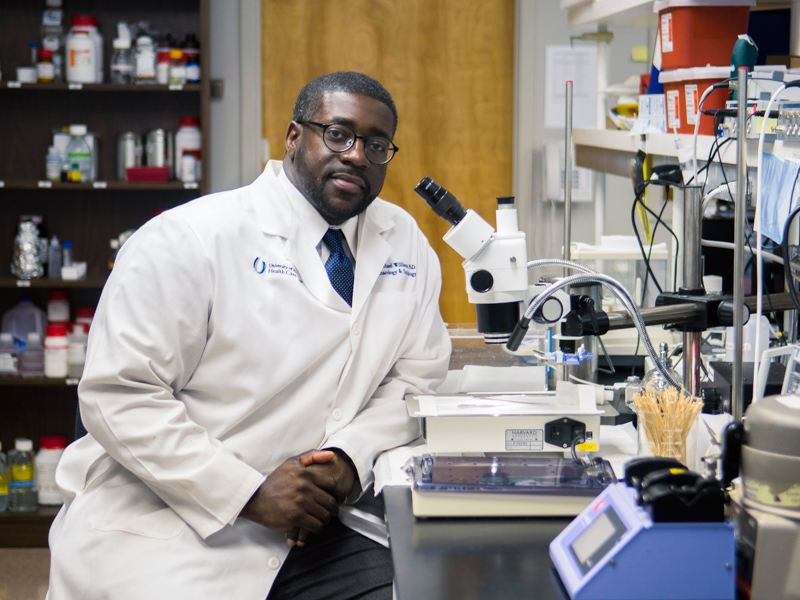Front and Center: Jan Williams

Editor's Note: In honor of Black History Month’s 2022 theme, Black Health and Wellness, we want to celebrate the contributions, breakthroughs and cultural richness of Black professionals and students at UMMC. See more Front and Center features.
Dr. Jan Williams once thought he might become a pharmacist, but an interest in chemistry and a health scare steered him toward biomedical research.
“During college, I developed an acute kidney injury,” Williams said.
Now a professor of pharmacology and toxicology at the University of Mississippi Medical Center, Williams studies the factors that contribute to kidney disease, particularly at an early age.
“Obesity is increasing at an alarming rate around the world, and we’re seeing more complications related to obesity in children,” Williams said.
These include type II diabetes and hypertension, which can damage the kidneys. However, obesity itself might contribute to renal disease in children, even before these other conditions emerge. Williams’ research uses a model to study the physiological mechanisms connecting pre-puberty obesity and renal disease.
After recovering from the kidney injury and graduating from Georgia Southern University, Williams studied hypertension and renal function as a PhD student at the Medical College of Georgia, then as a postdoctoral fellow at the Medical College of Wisconsin. There, his mentor was Dr. Richard Roman, until they joined the UMMC faculty in 2009.
Mentorship is a substantial part of Williams’ professional work. His National Institutes of Health-funded lab group has included PhD and postdoctoral trainees, as well as Base Pair and Summer Undergraduate Research Experience students.
In addition to his research, Williams directs the School of Graduate Studies in the Health Sciences’ PhD program in experimental therapeutics and pharmacology. As part of the job, he meets with prospective students and helps guide enrolled students through their degrees.
“The primary goal is to help them complete their program so they can excel every step of the way, and to give them the opportunities they need to succeed at every level,” Williams said.
He’s also invested in the success of scientists outside UMMC. In 2020, Williams and a group of researchers created Black in Physiology, a group providing resources and guidance to African American and other underrepresented scientists as they navigate the professional realm.
“We started having a conversation around diversity and inclusion in the biomedical sciences,” Williams said. As advocates, they host workshops and discussions meant to address the systemic barriers that limit the recruitment, retention and promotion of minority faculty.
“We’re committed to celebrating Black excellence in physiology,” Williams said.
At home, he and his wife have two more people they are guiding: a daughter in eighth grade and a son in 10th grade.
“We’re making sure we provide everything they need to succeed,” he said.
For Williams, that means spending weekends on the field or court sidelines, coaching his son’s football, basketball or baseball teams. He’s also intentional about serving as father figure or role model for other players.
Who mentors Williams? He says Roman and senior researchers have helped him, but he also notes the importance of other Black UMMC faculty, with whom he shares meals and advice.
“They have all been instrumental to my success,” he said.


